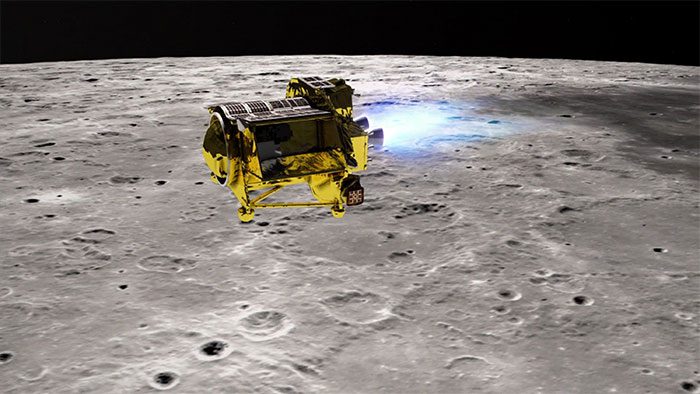The Japan Aerospace Exploration Agency (JAXA) has announced that its robotic probe, “Moon Sniper”, has successfully landed on the Moon’s surface, but the mission may end prematurely due to the spacecraft’s solar panels not generating power.
According to remote sensing data shared during JAXA’s live broadcast, the unmanned smart lander for the lunar exploration mission touched down on the celestial body at 12:20 AM Japan time on January 20 (11:20 PM Vietnam time on January 19).
CNN cited Japanese authorities stating that the “Moon Sniper” is operating on limited battery power, expected to last only a few hours. JAXA is still receiving normal communication signals from the lander. Experts from the agency are analyzing data to determine the cause of the solar panel malfunction and the next steps for the spacecraft.
JAXA officials believe that the solar panel issue may have occurred because Moon Sniper did not orient as planned. At a press conference, the research team expressed hope that as the angle of sunlight changes on the Moon, the panels might recharge. However, this could take time and will depend on whether the lander can survive the frigid night on the Moon.

The spacecraft successfully landed on the Moon using optical navigation.
JAXA believes the mission has met the criteria to declare a “minimum success.” This is because the spacecraft landed accurately and smoothly on the Moon’s surface by utilizing optical navigation.
This achievement makes Japan the third country in this century and the fifth globally, after the United States, Russia, China, and India, to have equipment land on Earth’s natural satellite.
SLIM Encounters Major Issues Serious issues were immediately reported following the landing: The solar panels of SLIM have failed to operate as expected. According to Space.com, JAXA officials stated that they are still investigating and addressing this electrical malfunction. It remains unclear why the solar panels did not function, but the likelihood of them being damaged is low. It is possible that the lander did not orient itself towards the Sun as anticipated. JAXA is still working to resolve the issue. In the worst-case scenario, SLIM could remain silent permanently in the coming hours as its reserve power dwindles. Lunar landings have never been an easy task Among the countries that have landed on the Moon, China and India achieved success in 2013 and 2023, respectively, while Russia and the United States have done so for over half a century. However, in recent years, four spacecraft from Israel, Japan, Russia, and the United States have failed consecutively. The Israeli, Japanese, and Russian spacecraft encountered issues during landing, crashing directly into the Moon and disintegrating, while the American spacecraft even failed to reach the orbit of the celestial body, having to return to “self-destruct” in Earth’s atmosphere on January 19 due to a fuel leak. |


















































